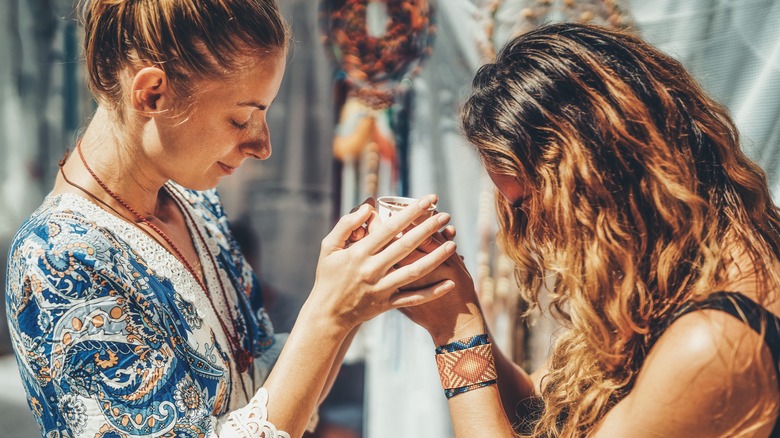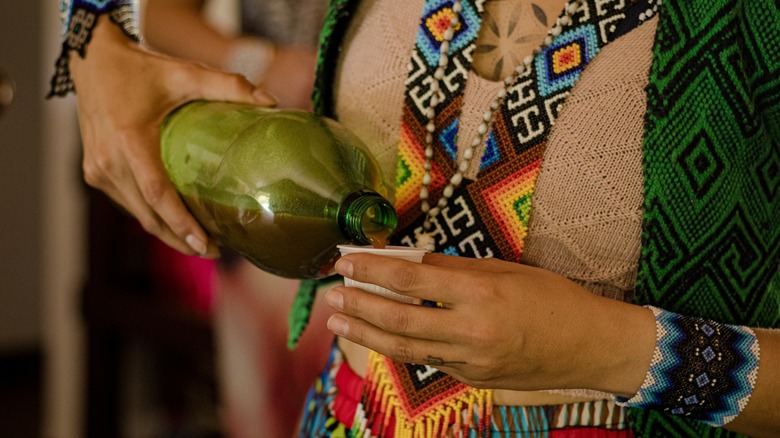A Psychiatrist Tells Us How To Spot Red Flags When Planning An Ayahuasca Retreat
Health-related tourism is nothing new, and there are several budget-friendly wellness retreats across America and around the world. Travel centered around yoga, digital detoxes, sobriety, and other health-promoting activities have been around for a while and feel just as mainstream as destination weddings and family beach vacations.
Ayahuasca retreats, another type of wellness-focused getaway, might not be commonplace just yet, but that appears to be changing. Online searches for "ayahuasca retreat" have been steadily climbing in the U.S. over the last decade, according to Google Trends, even if ayahuasca is illegal throughout the country. That might explain why people are willing to pack their bags and jet off to a retreat, often held in South or Central America, to experience the hallucinogenic brew.
However, like with any alternative medicine or mind-altering substance, it's crucial to proceed with caution when planning your trip (no pun intended). Explore spoke with Dr. Ryan Sultan, psychiatrist and integrative medicine specialist, about the red flags and must-dos travelers should keep in mind before signing up for a retreat. As he tells us exclusively, "Embarking on an ayahuasca retreat requires thoughtful preparation. The brew, known for inducing vivid visions and emotional revelations, demands respect for its power and potential." Dr. Sultan notes that while the drink can offer relief from trauma and depression, it's not without risks.
Know what you're signing up for
Ayahuasca may be gaining popularity, but don't look at it as just another trend to try. As Dr. Ryan Sultan urges in his exclusive conversation with Explore, those considering an ayahuasca retreat should thoroughly research the drug first. "Understand the historical, cultural, and psychological facets of ayahuasca and familiarize yourself with its effects, both immediate and long-term," he says. For instance, the brew can trigger physical side effects such as vomiting and an increase in blood pressure, as well as emotional distress.
Even if ayahuasca might not yet be embraced in modern medicine, it's important to speak with a medical professional before booking your trip, explains Dr. Sultan. "Disclose any existing mental health conditions, medications, and concerns. This conversation ensures your physical and psychological suitability for the experience." This pre-retreat doctor's visit is essential, as some medications shouldn't be mixed with ayahuasca. Moreover, the substance is known to exacerbate some mental health conditions. A healthcare professional can determine if you're a good candidate for the psychedelic experience.
How to identify a trustworthy ayahuasca retreat
Once you feel confident in your decision to try ayahuasca, Dr. Ryan Sultan suggests choosing a retreat that's credible and legitimate. "A reputable retreat will provide comprehensive information and transparent communication," he tells Explore. Look for facilitator qualifications, testimonials from past participants, and connections to traditional indigenous healers. "Additionally, these retreats prioritize safety protocols, medical screening, and psychological support," Dr. Sultan adds.
A retreat without an authentic shaman could be a red flag, as is any company or organization that uses pushy sales tactics. Dr. Sultan warns of retreats that guarantee specific results or "miraculous cures." Both before and during the experience, facilitators should also never pressure participants. "Everyone's journey with ayahuasca is personal. Retreats should respect individual readiness and consent," notes the psychiatrist.
Keep in mind that most of the drug's purported benefits come after — not during — use. With this in mind, Dr. Sultan reveals that trustworthy retreats should offer personalized support even after your trip is over. "Post-retreat integration is vital for translating insights into meaningful life changes. Lack of follow-up support is a concerning sign," he cautions. "Remember, the path to healing is as personal as the visions the brew might reveal, necessitating a tailored approach to each individual's needs and experiences."


